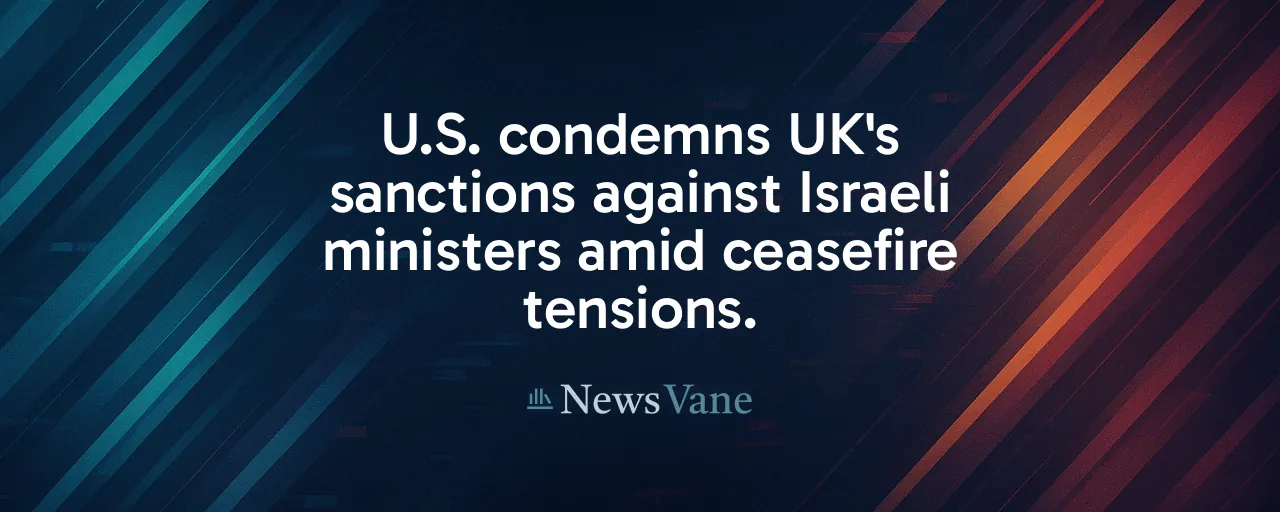A Growing Divide
A rare public spat has erupted between the United States and some of its closest allies. On June 10, 2025, the U.K., Canada, Norway, New Zealand, and Australia placed sanctions on two Israeli cabinet members, accusing them of inciting settler violence. The U.S. State Department quickly condemned the move, calling it a setback for ceasefire efforts in the Israel-Hamas conflict.
This disagreement highlights a deeper rift over how to handle the war's escalating toll. With over 51,000 Palestinians and 1,200 Israelis killed, global concern is intensifying. The sanctions reflect a push by some allies to hold Israeli officials accountable, while the U.S. remains steadfast in its support for Israel, urging focus on Hamas's actions.
The Sanctions Explained
The sanctions target Israeli ministers Itamar Ben-Gvir and Bezalel Smotrich, blamed for inflammatory rhetoric and enabling settler attacks in the West Bank. These measures, including asset freezes and travel bans, aim to curb violence and signal disapproval of Israel's far-right policies.
Targeted sanctions are a diplomatic tool to influence behavior without military force. Here, they mark a shift among some Western nations increasingly critical of Israel's conduct in Gaza and the West Bank. The U.S., however, argues that such actions complicate hostage negotiations and shift attention from Hamas, which it labels a terrorist group holding civilians captive.
U.S. Policy and Public Views
The U.S. response underscores its deep alliance with Israel. State Department officials warn that sanctions could isolate Israel further, hindering talks to free hostages and end the war. This stance reflects a belief that Israel, a key regional partner, faces unique security threats that demand solidarity.
American public opinion is divided. Surveys show 76% of Republican voters support ongoing military aid to Israel until hostages are released, while 59% of self-identified liberals believe Washington is doing "too little" to protect Palestinian civilians.
Global Perspectives Shift
The sanctions fit into a broader pattern of international concern. The United Nations has called Gaza's humanitarian crisis a grave moral failure, pressing for unrestricted aid and accountability from both Hamas and Israel. European nations have paused trade talks with Israel, citing violations of international law tied to its blockade and military operations.
These moves reveal strains in Western alliances. Analysts note that such divisions could weaken NATO's unity and give rivals like China and Russia opportunities to exploit perceived Western double standards. If support for Israel erodes, Israel may seek new partnerships outside the West, reshaping regional dynamics.
Humanitarian Crisis in Focus
Gaza's suffering lies at the conflict's core. Nearly two million people are displaced, and 500,000 face famine risks. Israel's tight aid restrictions, tied to demands for hostage releases, have sparked criticism for worsening civilian hardship.
The U.S.-supported Gaza Humanitarian Foundation struggles to reach 60% of Gaza's population, slowed by convoy attacks and bureaucratic hurdles. International law requires protecting civilians, but accusations of violations by both Hamas's hostage tactics and Israel's military strikes complicate aid delivery, leaving humanitarian workers in a precarious position.
Looking Ahead
This diplomatic clash highlights the challenge of aligning security and humanitarian goals. The U.S. presses for a ceasefire and hostage release, but its rejection of allied sanctions risks straining ties with partners. Those allies are challenged to balance their critique of Israel with the need for a cohesive Western stance.
For people on the ground, the consequences are real. Gazans face delays in aid that could save lives, while Israelis live with the threat of further violence. Resolving the conflict remains daunting, but the current discord shows how even allies can diverge on the path forward.
The outcome of this tension will ripple beyond the Middle East. Whether the U.S. and its allies can bridge their differences will influence the war's trajectory and the strength of global partnerships in an uncertain world.
